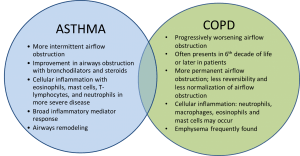
Asthma and COPD may seem similar because of shared symptoms. But understanding how the two are distinct can help you enjoy a better quality of life.
Wheezing, coughing, and shortness of breath are common with both asthma and chronic obstructive pulmonary disease (COPD), and the two conditions can even co-exist, particularly in people who smoke. But there are significant differences between them.
With asthma, large airways, or tubes, in your lungs constrict, making it more difficult to get air out. Emphysema-caused COPD leads to the loss of elasticity in the lungs, and COPD from chronic bronchitis leads to the tubes getting thicker, making it more difficult to get air in and out.
There are other distinctions between asthma and COPD, which are important in terms of proper diagnosis:
Age of onset. Asthma is most often diagnosed in childhood or young adulthood, while COPD is generally diagnosed later in life, often after age 40.
Underlying cause. Asthma’s causes are not fully known, but it is often triggered by allergies or environmental factors, including cigarette smoke. In the United States, COPD is due almost entirely to smoking cigarettes, although long-term exposure to certain substances in the workplace, such as chemical fumes and air pollution, can also cause the condition.
Timing and severity of symptoms. People with COPD often start their day with a “productive” cough, meaning they bring up phlegm; COPD symptoms are chronic, affecting everyday life. People with asthma tend to have a dry cough and wheeze, symptoms which may become worse at night; following a careful management plan can help control asthma symptoms.
Related symptoms. Asthma is often accompanied by other allergy-related symptoms, like eczema or rhinitis, while COPD is not.
Related conditions. People with asthma are very likely to have gastroesophageal reflux disease (GERD), while people with COPD are much more likely to have congestive heart failure.
Course of disease. COPD is considered to be a progressive loss of lung function, while asthma can be controlled.
Treating Asthma and COPD
There is considerable overlap between asthma and COPD treatments. Many options will help if you have asthma, COPD, or both. As a result, those same medications are often prescribed to people with COPD to relieve breathing difficulty.
Treatments for one or both conditions include:
Inhaled bronchodilators. Short- or long-acting medications may be prescribed to improve breathing for both asthma and COPD.
Inhaled corticosteroids. These steroids may be recommended for asthma or COPD when symptoms flare or worsen.
Lifestyle changes. People with either asthma or COPD, or both, benefit from lifestyle changes such as changing the home environment to remove triggers, eating more healthfully, controlling weight, and being more physically active.
Vaccinations. People with both conditions need to keep their vaccinations up to date, including a yearly flu shot.
It’s important to note that not all asthma medications help with COPD symptoms, and additional measures may be necessary. Leukotriene receptor antagonist medications such as montelukast (Singulair), effective for people with asthma, don’t have an impact on COPD, even though COPD patients sometimes request and use them. Because of the chronic and progressive nature of COPD, people with this condition might need to use oxygen as directed by their physician as well.
Understanding the differences between the two conditions, and the best ways to treat them, can help ensure you have the best quality of life.
Article Source: http://www.everydayhealth.com/copd/the-differences-between-asthma-and-copd.aspx

